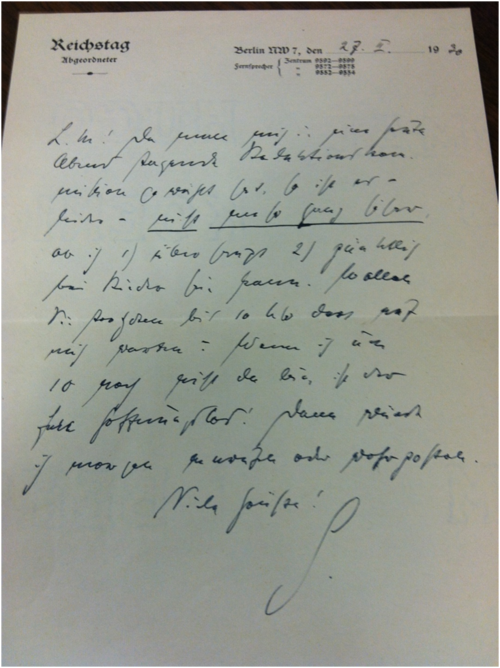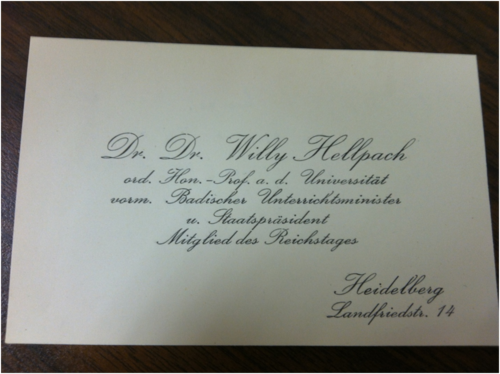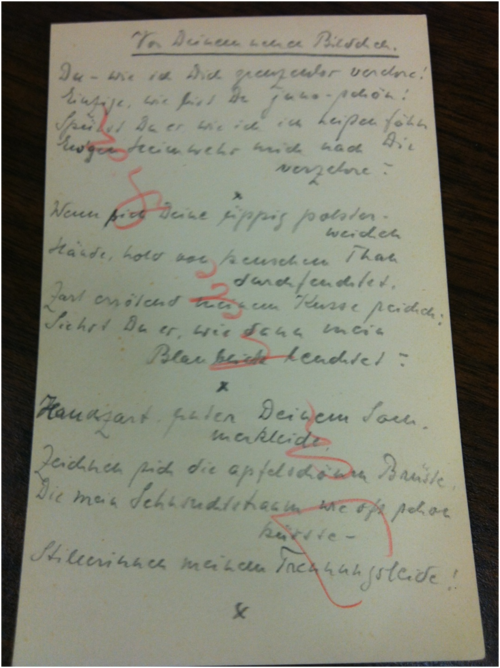
Letter from Willy Hellpach to Martha Kubatzki on Reichstag stationery, 1930
Out of the Archives
An Epistolary Romance
by Catherine Greer, Archival Processing Fellow, Center for Jewish History
I spent two weeks at the Center for Jewish History as a Graduate Archival Processing Fellow. The twelve-day program provided me with a wealth of theoretical knowledge, hands-on experience in archival processing–and an unexpected historical intrigue.
On the first day of the program, we were introduced to all of the Center’s archivists, went on a tour of the building and had the first of many lively discussions about our assigned readings. The following day, my supervising archivist, Lea Lange, and I retrieved the collections she had recommended I process. My background includes degrees in German and music, and I was pleased that Lea had taken the time to find collections related to my interests.
The first collection I processed was full of surprises! The collection consists mostly of poems and love letters written to Martha Kubatzki, a young woman who worked as a secretary at the Lessing Hochschule in Berlin. I determined that the letters were written by Willy Hellpach, the sixth State President of Baden, Germany, in the early 1930s. While this fact alone was fascinating, I then discovered that at the time, Hellpach was married to another woman named Olga.

Willy Hellpach’s business card, 1929
This relationship between a married man and a young Jewish woman in the early 1930s was extremely intriguing. Unfortunately, the letters and poems end abruptly in 1935, and there is no further information about their affair. It will remain a mystery–unless more materials surface to fill in the gaps.

Poem written by Hellpach to Kubatzki, 1934. The words “I love you” are written across the poem in red, a decorative touch Hellpach added to much of his correspondence to Kubatzki.
While we spent most of our time during the fellowship processing assigned collections, we also met regularly with two supervising archivists for discussions about our reading assignments. The topics ranged from processing and archival theory to a case of archival theft.
Through these discussions, I learned that archivists are not responsible for preserving a historical record, but also actively contributing to collective memory. The fellowship program gave me valuable work experience in archival processing and enhanced my skills as a researcher as well.
The guide to the collection I worked on is now online, and the collection will soon will be digitized as well.
About the Archival Fellowship program:
The Center for Jewish History’s newly launched Archival Fellowship Program provides young scholars in the field of Jewish Studies with the opportunity to gain hands-on experience in an archival institution, using the knowledge of language, history and culture they have developed in their studies. By working with diverse collections from our partner institutions, fellows are introduced to basic archival theory and practice, strengthening their capabilities as researchers and opening up new professional directions for them.
The primary focus of the fellowship is on archival processing. In the course of processing a collection from start to finish, the fellows organize the collection in ways that will make the materials more accessible to researchers; write a descriptive online guide (also known as a finding aid) so that potential users can determine whether the material is relevant to their interests; and rehouse the collection to ensure its long-term stability.
In the Winter 2014 pilot of the program, our Center archivists trained two fellows, Stefanie Halpern and Catherine Greer (author of this post), who boast subject specialties in Jewish Studies and the performing arts. The pilot set us on a steady course for a larger-scale iteration of the program in the summer of 2014, when we will host six international and domestic fellows with support from The Rothschild Foundation (Hanadiv) Europe. For more information about this and other Center fellowships, see our list of fellowship programs or contact our Senior Manager for Archival Services, Rachel C. Miller, at rcmiller@cjh.org.
